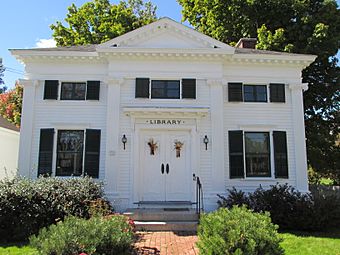Wakefield Public Library facts for kids
The Wakefield Public Library is a special building in Wakefield, New Hampshire. It's where people can find books and learn new things. This beautiful building was given to the town by a famous educator and politician named Seth Low. It's known for its Colonial Revival style, which looks like old American buildings. The library building was added to the National Register of Historic Places in 1984 because it's an important part of history.
|
Wakefield Public Library
|
|
|
U.S. Historic district
Contributing property |
|
 |
|
| Location | 2699 Wakefield Rd., Wakefield, New Hampshire |
|---|---|
| Area | 0.1 acres (0.040 ha) |
| Built | 1894 |
| Architect | Greene, Ernest |
| Architectural style | Colonial Revival |
| Part of | Wakefield Village Historic District (ID84002521) |
| NRHP reference No. | 83001132 |
Quick facts for kids Significant dates |
|
| Added to NRHP | September 8, 1983 |
| Designated CP | March 15, 1984 |
Contents
Discovering the Library's Design
The Wakefield Public Library is in Wakefield Village. It's a two-story building made of wood. The outside is covered with clapboards, which are long, thin boards. The building sits on a strong granite foundation.
Special Architectural Features
The library has fancy details that make it stand out. It has tall, grooved pillars called pilasters on its corners. These pillars reach up to a decorative band around the top, known as an entablature.
The main entrance has a gabled roof that sticks out. This gable is shaped like a triangle and has small, block-like decorations called modillions. You can also see these modillions along the main roof's edge.
The front door is a double door, meaning it has two parts that open. It has narrow boards on each side. Above the door is another decorated band with modillions. The windows on the first floor are regular sash windows. The windows on the second floor are shorter casement windows, which open outwards.
The Story of Seth Low and the Library
The library building was a gift from Seth Low. He was a very important person. Seth Low was known as an educator and a politician. He was the president of Columbia University. He also served as the Mayor of New York City.
Seth Low's Connection to Wakefield
Seth Low was born in Wakefield. He always kept in touch with his family there. He cared a lot about his hometown. He helped start the Wakefield Public Library in 1879. He also helped get its official operating paper in 1895.
A New Home for Books
In 1895, Seth Low gave a small law office building to the town. This building became the first home for the library's books. But by 1902, the library had grown too big for that space.
So, Seth Low decided to help again. He paid for the building we see today. The new library building was finished in 1902. It was designed by an architect named Ernest Greene from New York City. This building is one of the best examples of Colonial Revival style in Wakefield.
 | DeHart Hubbard |
 | Wilma Rudolph |
 | Jesse Owens |
 | Jackie Joyner-Kersee |
 | Major Taylor |



